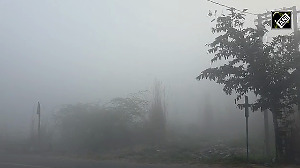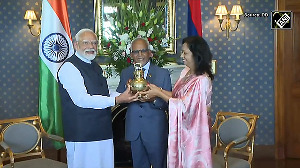With states stoutly opposed to the National Counter Terrorism Centre in its current form, Home Minister P Chidambaram has assured that the matter of re-location of the anti-terror body outside the Intelligence Bureau would be re-examined.
In his concluding remarks at the chief ministers' conference, which were released officially on Sunday, the home minister sought to clarify the decision of placing the NCTC within the IB.
"I may recall, when I stood at this very podium in December 2009, I did not propose that the NCTC should be located in the IB. In fact, the new security architecture was certainly more ambitious but did not propose that it should be located in the IB".
He said that a decision was taken to locate the NCTC in the IB because the Group of Ministers which made its recommendations in 2001 named the IB as India's nodal counter-terrorism agency.
"A number of speakers who pointed out that we must have a NCTC, asked why should it be located in the IB? Certainly this matter deserves re-examination and we will certainly re-examine it," the home minister said.
Chidambaram said that he had come to the meeting with an open mind for the discussion on NCTC, which he termed as "extremely important" in order to face the threat of terrorism to the country.
"I came to this meeting with an open mind and I continue to keep an open mind and I assure you that all your suggestions will be carefully considered before a decision is taken by the government," he said.
"Ultimately, however, the government would have to take a decision. Taking no decision on a matter of such urgency does not advance the objectives for which we have met," he said in his remarks.
Chidambaram said, "We will give serious attention to both those who strongly supported the proposal and those who suggested that it should be rejected outright".
Advocating an agency like NCTC, he said the country had both intelligence agencies like the IB and investigative agencies like the NIA.
"Between intelligence agencies and investigative agencies under the traditional system of administration of law and order, we have the police, but my experience in this job for the last three and a half years tells me that what we need is not simply a police organisation; what we need is a counter terrorism organisation," he said.
"So we need to move beyond looking upon counter-terrorism as a police operation and enlarge our scope to make it a truly counter-terrorism organisation that will mobilise all elements of national power," he said.
The home minister said that while every successful case of the past three years has been documented, so has been every case of failure.
On the cases of failure, the home minister said the failures have been mainly because of lack of timely decisions and lack of capacity.
"Each case of failure contains within it the potential of another terrorist attack, therefore, we cannot afford to fail. The adversary can fail 99 out of 100 times but the state, the governments, cannot afford to fail even once out of hundred times," he said.
The home minister added, "We think the NCTC or any other organisation or any similar organisation will fill this gap".
About giving operational powers to the NCTC, he said that such a situation will rise only under exceptional circumstances.
"But I recognise that a number of speakers are not still satisfied and they want more safeguards on this and those who gave qualified support are not satisfied with the safeguards that are built in. So this requires greater reflection," he said.
"Hard decisions have to be taken. Our decision cannot be based upon our past experience alone, because the past does not contain any indicators. We do not have experience of many matters. Some risks have to be taken; some calibrated steps have to be taken. But given the nature of threats we face, we must take hard decisions," he said.
Chidambaram appealed to the states to work together with the Centre in making India a safer and more secure country for the people.









 © 2025
© 2025